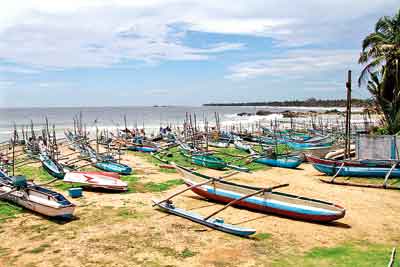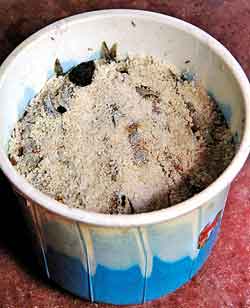Stopping by the land of jaadi

Fishing boats on the Dodanduwa coast
Be it kumbalawa, balaya, kelawalla, iratawalla, alagoduwa or linna, Dodanduwa has them all. Justice cannot be done to the staple of this Southern coastal town- jaadi with its blunt English translation of ‘salted fish’! This goraka and salt stuffed fish best eaten with white rice, parippu, pol mellum and thakkali (tomato) sambol, hailed as a rice puller, is a delicious treat! But those in search of the traditional jaadi of Dodanduwa will be disappointed as it is virtually non-existent today. The few still making the fish have replaced the leak-proof large wooden barrels and clay pots in which the fish was traditionally prepared with plastic buckets and barrels.

Chaminda Dahampriya
Although jaadi-making involves only a three-pronged process of washing the fish, stuffing it and stacking it amidst layers of goraka and salt, the taste it renders depends on the ath-gunaya or the dexterity of the jaadi-maker, says Himali Maheshika. Himali, although not claiming a traditional jaadi lineage from Dodanduwa, her father being a vegetable trader, is among the leading jaadi entrepreneurs of the area today.
Kumbalawa is the king of jaadi as Himali explains. The monthly catch of 20-25 kilos which she gets from the Dodanduwa Fisheries Harbour is washed thoroughly and is sliced for the stuffing of goraka and salt, commonly called lunijja. “In the olden days, goraka which was smoked-dried in dum-messaat homes was used to assure best

Storing the jaadi: Plastic instead of the traditional wooden barrels. Pix by Indika Handuwala
taste but today it’s not easy to source it, so we are forced to buy from the market,” notes Himali adding that wooden barrels have been replaced with large plastic barrels.
Once the first layer of salt is placed at the bottom of the barrel, the stuffed fish is placed in several layers, with salt and goraka in between the layers of fish. Moisture and flies are the worst enemies of jaadi as Himali points out. “A container of jaadi is left to ferment for one month, during which time its lid should be air-tight.”

Himali Maheshika
A perfectly fermented jar of jaadi will not only have an appetizing aroma, but as Dodanduwa jaadi folks assure, such stock could be consumed even up to a year. “Ooral wena tharamata rasai,” they say (older the better it is).
Chaminda Dahampriya bemoans that his generation is probably the last generation in Dodanduwa to keep its jaadi legacy alive. “Aluth paramparawa me gena undandu ne” (the new generation is not interested in this trade). Once sought after, jaadi dansal of Dodanduwa teeming with city folks forming long queues to taste this palatable appetizer are long gone, he laments.
Chaminda points out that the price of jaadi depends on the type of fish it involves. “Balaya and kelawalla are more expensive,” he says.

The catch of the day
Jaadi mudalalis who had a thriving business even in South India were not uncommon in Dodanduwa at one time. A skilled group of local workmen or baas unnehes who specialised in making of large wooden barrels out of halmilla and suriya to store jaadi were commissioned for the task by these traders. These baas unnehes are now long gone, except for one who is an invalid, Dodanduwa folk tell us.
K. Sumanasiri whom we meet at the Dodanduwa Fishery Harbour recalls his father, K.P.W. Richel Appu going on such jaadi-making missions. “They went mostly to Calicut, Cochin and Tuticorin or Thoothukudi and once the fish was salted, they dispatched the leak-proof barrels in boats from these areas to the Dodanduwa Harbour. When the cargo was unloaded, it was a hive of activity those days,” recollects Sumanasiri who shares with us his father’s ‘Emergency Certificate’ granted for the enterprise in the late 1950s.
The jaadi industry which is fast vanishing from Dodanduwa is supported by the Saviya Development Foundation in Galle. Production Manager, Thushara Senananayake notes that dying industries such as jaadi and coir are offered an easy-payment loan scheme of up to Rs. 100,000.
But whether this is enough to keep the industry alive is the question.


